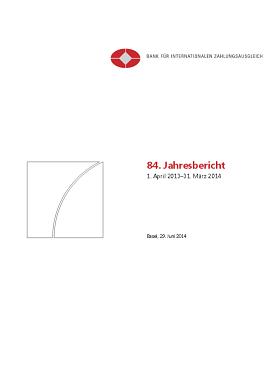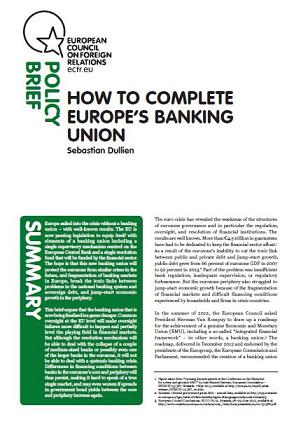Bank for International Settlements (2014) 84th BIS Annual Report, 2013/2014, BIS Publications, 29 Ιουνίου. A new policy compass is needed to help the global economy step out of the shadow of the Great Financial Crisis. This will involve adjustments to the current policy mix and to policy frameworks with the aim of restoring sustainable and balanced economic growth. The global economy has shown encouraging signs over the past year …Read More
Lessons from history for the European Financial Crisis
Sayek, S. & Taskin, F. (2014) “Lessons from history for the European Financial Crisis“, VoxEU Organisation, 05 Ιουλίου. The European Monetary Union is unprecedented, but the Eurozone Crisis is not. This column draws upon the experiences of previous banking crises, and compares the Eurozone Crisis countries. Like Japan before the 1992 crisis, Spain and Ireland had property bubbles fuelled by domestic credit. The Greek crisis is very distinct from …Read More
Why We Need More Social Europe
Crouch, C. (2014) “Why We Need More Social Europe“, Social Europe Journal, 04 Ιουλίου. Globalization makes international collaboration more urgent; but it also makes it less likely to happen. Marketization requires social policy, not only to combat the negative effects of markets, but also to support the market with things it cannot provide for itself; but marketization and social policy are usually seen as opposed projects. For Europeans, confronting …Read More
How to complete Europe’s banking union
Dullien, S. (2014) “How to complete Europe’s banking union“, Policy Brief, European Council on Foreign Relations – ECFR, 02 Ιουνίου. The new European banking union arrangements represent a landmark in European integration which will fundamentally change the financial sector in the European Union. It will make a systemic banking crisis less likely and will help bring down financing costs in the euro periphery, contributing to an economic recovery in …Read More
Ευρώπη και σκεπτικισμός: Η Ε.Ε χωρισμένη στα δύο
Μπαφούνης, Η. (2014) “Ευρώπη και σκεπτικισμός: Η Ε.Ε χωρισμένη στα δύο“, Άρθρο Γνώμης, Διαδικτυακή Εφημερίδα Επτά Ημέρες, 02 Ιουνίου. 30 Μαρτίου 2014, β’ γύρος δημοτικών εκλογών στην Γαλλία. Το ακροδεξιό Εθνικό Μέτωπο της Μαρίν Λε Πεν κερδίζει τουλάχιστον 14 πόλεις, τις περισσότερες από ποτέ, και αφήνει τους σοσιαλιστές του Φρανσουά Ολάντ να διαχειριστούν την αποδεδειγμένη ήττα τους. Τα αποτελέσματα αποδεικνύουν ότι η άνοδος των ευρωσκεπτικιστών στην Ευρώπη συνεχίζεται με …Read More
Which Options for Mr. Renzi to Revive Italy and Save the Euro?
Bossone, B., Cattaneo, M. & Zibordi, G. (2014) “Which Options for Mr. Renzi to Revive Italy and Save the Euro?“, Economonitor – A Rubini Global Economics Project, 03 Ιουλίου. Since 2008, Italy’s industrial production has shrunk 25 per cent. In the last quarter of 2013, while exports reached back to almost the same level as in 2007, household consumption was down by about 8 per cent and investment by …Read More
Durable consumption during recessions
Berger, D. & Vavra, J. (2014) “Durable consumption during recessions“, VoxEU Organisation, 03 Ιουλίου. Various stimulus programmes have been implemented in a response to the decline in consumption of durables since the Recession. This column argues that standard analysis of such programmes could be overstating their effectiveness. Aggregate durable spending is much less responsive to stimulus during recessions. Microeconomic frictions lead households to adjust their durable holdings less frequently. …Read More
The euro crisis: Muddling through, or on the way to a more perfect euro union?
Aizenman, J. (2014) “The euro crisis: Muddling through, or on the way to a more perfect euro union?“, VoxEU Organisation, 03 Ιουλίου. After a promising first decade, the Eurozone faced a severe crisis. This column looks at the Eurozone’s short history through the lens of an evolutionary approach to forming new institutions. German dominance has allowed the euro to achieve a number of design objectives, and this may continue …Read More
The EU Services Directive: Gains from Further Liberalization
Fernández Corugedo. Ε. & Pérez Ruiz, Ε. (2014) “The EU Services Directive: Gains from Further Liberalization“, IMF Working Paper No. 14/113, 01 Ιουλίου. The EU Services Directive was adopted in 2006 to foster competition in services across Europe. However, progress in liberalizing services has fallen short of expectations due to the article 15 of the Directive, which allows countries to maintain pre-existing restrictions if judged necessary to protect the …Read More
The EMS Crisis of the 1990s: Parallels with the present crisis?
Gros, D. (2014) “The EMS Crisis of the 1990s: Parallels with the present crisis?“, Economic Policy, CEPS Working Documents, 28 Μαρτίου. The EMS crisis of the 1990s illustrated the importance of a lack of confidence in price or exchange rate stability, whereas the present crisis illustrates the importance of a lack of confidence in fiscal sustainability. Theoretically the difference between the two should be minor since, in terms of …Read More






